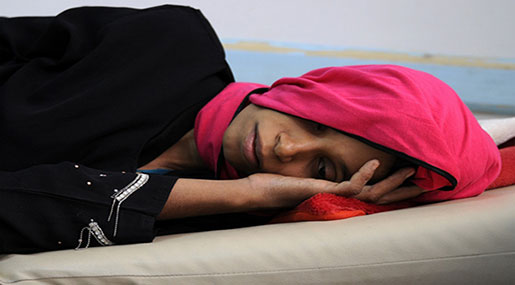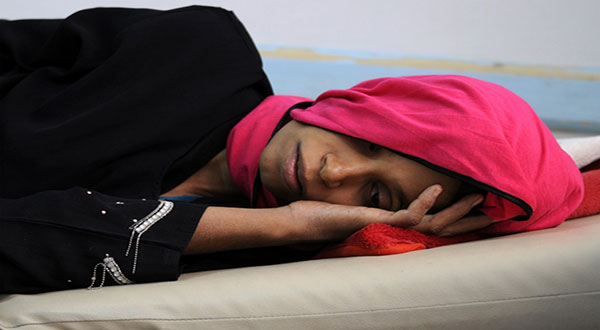
Yemen’s Man-Made Cholera Outbreak Is About to Break a Record

Dan De Luce
In a matter of days, the deadly cholera epidemic in Yemen will set a world record.

The outbreak is entirely man-made. Two-and-a-half years of war have decimated Yemen's water sanitation system and its hospitals. Without access to clean water, doctors, or medical supplies, hundreds of thousands of Yemenis have contracted cholera, which spreads through fecal bacteria in water.
Aid organizations blame both sides in the conflict, which pits a Saudi-led coalition armed by the United States against Ansarullah revolutionaries.
At last count on Oct. 1, Yemen had 777,229 suspected cases of cholera, with the death toll at 2,134 people, according to the World Health Organization. Soon, Yemen will surpass Haiti, which has documented about 815,000 cholera cases. In Haiti, however, the outbreak began in 2010 and has taken seven years to reach that figure. In Yemen, it has taken only about six months to reach those alarmingly high numbers.
"Since WHO records began in 1949, there hasn't been a faster outbreak on record than we've seen in Yemen," Ruairidh Villar of Save the Children told Foreign Policy. "And in the next few days, Yemen will also become the largest since records began."
The International Committee of the Red Cross has warned that if current trends persist, Yemen could have a million cholera cases by the end of the year.
More than half the cholera patients are under the age of 18, and 26 percent are under the age of five, according to WHO statistics.
"It is completely shocking. The existence of a cholera outbreak in general is unforgivable in the 21st century because it means there's no access to clean water or sanitation," Villar said. "This shouldn't happen."
Health experts say the precise reason why cholera has spread so quickly in Yemen remains unclear. But with health workers no longer getting paid or no longer able to visit some communities, and much of the population lacking access to clean water, the war has created the conditions for the unprecedented outbreak.
"While it's difficult to get information about what exactly has led to the outbreak, it's clear that Yemen's health infrastructure and sanitation services have come under sustained attack throughout the course of the conflict, allowing bacteria like cholera to easily spread," said Homer Venters, director of programs at New York-based Physicians for Human Rights.
"What's more, while cholera is treatable, life-saving medical supplies aren't reaching communities in need. The closure of airports and a naval blockade has left tens of millions of people in Yemen without vital humanitarian aid," he said.
Human rights organizations have criticized both sides of the war for hampering the delivery of relief supplies and have singled out Saudi Arabia and its Gulf partners for bombing hospitals and other civilian sites, delaying or turning away ships and aircraft carrying aid, and preventing the delivery of US-funded cranes to unload supplies at the port of Hodeida.
US lawmakers from both parties also have criticized the Saudi-led coalition, and several have called for halting the sale of American-made bombs and other weapons to Riyadh, citing the soaring toll on civilians from air raids and the mounting humanitarian crisis.
Cholera is endemic in many countries in Asia and Africa, and its origin has been traced back to the Ganges Delta in Bangladesh. It's a disease that afflicts poorer countries with flawed sanitation and unsafe drinking water. If left untreated, a patient can die of dehydration. But cholera can be treated relatively easily and inexpensively with clean water and intravenous fluids.
"If you can give somebody clean water, a drip for the severest cases, you can transform somebody from essentially the brink of death to sitting up and well again in hours," Villar said.
A safe oral vaccine has also been developed that can help contain a cholera outbreak. International health organizations had plans to distribute the vaccine but canceled the campaign in July, citing dangerous conditions on the ground.
Source: Foreign Policy, Edited by website team
Comments



